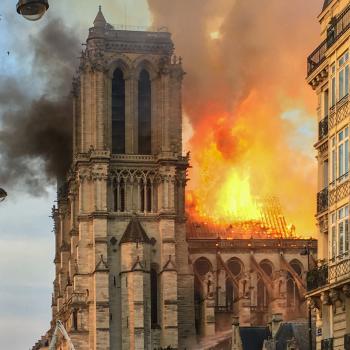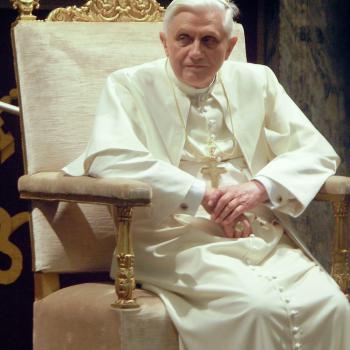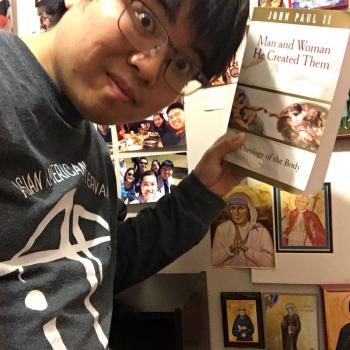Let me begin this post by congratulating Alastair Sterne for finding common ground with Douglas Todd on the question of government. In the previous posts, I have chided Sterne for not realizing how much common ground his articulation of ‘classical Christianity’ had with Todd’s version of ‘liberal Christianity,’ and in this most recent post, he seems to be celebrating in their commonalities, so much that Sterne has written a ‘much shorter response’ for which we are supposed to ‘breathe a sigh of relief.’ In Todd’s words, here is the statement with which Sterne establishes ‘common ground’:
Along with Obama, Trudeau and Layton, B.C. Premier Christy Clark and Ontario Premier Kathleen Wynne would fall into the liberal Christian camp. Their political differences suggest just how diverse liberal Christians can be. But it’s fair to say most liberal Christians, from Martin Luther King to Tony Blair, are not anti-government activists like those in the American Tea Party. Liberal Christians generally believe governments can be a force for good, including for upholding human rights, providing social services and reducing the gap between the rich and the rest.
What Sterne finds so appealing about this statement is that the title statement – governments as a potential force for good — is the word ‘potential.’ Also eschewing the extreme neoliberal politics of the American Tea Party in which, as Ronald Reagan once said, ‘government is the problem,’ Sterne claims that classically Christian doctrine would hold that governments can potentially act as a force for good, though they could potentially abuse their power as well. Explaining that Jesus’ alternate vision of power seen through the matrix of death and resurrection would eschew the abuse of power for the common good, Sterne holds up Dutch Calvinist theologian and politician Abraham Kuyper as the model for Christocentric politics, one in which the Lordship of Christ would ensure the goodness of the political system. In so doing, Christians may themselves be scattered across the political spectrum, but because they submit to a higher power that has redefined politics for the common good, they themselves work toward a common purpose of human flourishing through ‘the good functioning of government.’
In principle, Sterne’s simple political vision is relatively uncontestable in ‘classically Christian’ terms, although all the talk about the sovereignty and lordship of Jesus Christ over politics might have some, such as Globe and Mail journalist Marci McDonald, worried about a theocratic takeover of the Canadian government at various levels of governance. However, the question is whether Sterne’s simple vision of submitting to a higher power is workable in practice. That’s because — as both Todd and Sterne imply — the government in a democratic polity is not something that’s out there; it’s a governing force in which residents and citizens participate.
The word for that kind of participating polity is civil society.
The classic text that’s used to understand civil society is critical theorist Jürgen Habermas’s Structural Transformations of the Public Sphere. In fact, I highly recommend it. That’s because Habermas gives a historical account of why the ‘public sphere’ of civil society, that is, the gathering of citizens to converse and deliberate about the workings of the state, is actually really important to the actual workings of the state. Once upon a time, what the ‘public’ meant was the state and its court, located out there from the citizenry as something to watch, sort of like a play. But as democratic sentiments developed and citizens were increasingly commenting on the workings of the state, these democratic deliberations — or what was known as public opinion — needed to be taken into account by the state. In this way, the state could be held accountable by its citizens, that is to say, the citizens never really banked on Sterne’s argument by ‘potential’ as to whether the state could work for the common good or abuse its power. Instead, they were going to make the state work for the common good by discussing it, criticizing it, deliberating about it, and participating in its policymaking. A democratic government is basically when this public opinion in this public sphere of civil society in effect runs the state.
And Canada is democratic.
This means that the real question that we should be asking isn’t whether government is a potential force for good and how they might hypothetically be turned for good. Even with Sterne’s theological answer that turns our gaze upon Jesus and looks full on his wonderful face, that the things of earth grow strangely dim in the light of his glorious grace does not in fact somehow negate the way that governments are not simply out there, but are instead diffused among the citizenry, at least theoretically. (Practically, in Canada, this would mean that the citizenry needs to push back on the dismantling of the Canadian Broadcasting Company and in the United States, it means that they would need to work to overturn the Citizens United decision because, in the prophetic words of Elizabeth Warren, ‘No, corporations are not people. People have hearts, they have kids, they get jobs, they get sick, they cry, they dance. They live, they love and they die.) The question, then, is not whether governments are a potential force for good. It’s: how should the people of God participate in the civil society whose deliberations effectively run the state?
The great thing, though, is that there is a classically Christian approach to the civil society question. It’s called Catholic social teaching.
As I said in the very first post in this series, Catholic social teaching is a late nineteenth/early twentieth-century magisterial interpretation of how classical Christianity is to be lived in the politics of the contemporary world. It arguably dates back to Leo XIII’s encyclical Rerum novarum, or less commonly, ‘On Capital and Labor.’ Speaking of a ‘middle way’ in the course of our conversation between ‘liberal’ and ‘classical’ Christianity, Leo XIII proposes a middle way between two systems of governance that has dominated modern political imaginaries: capitalism and socialism. This means, of course, that much of what Catholic social teaching addresses is the state and its role in governing political economies.
What’s great about the argument in Rerum novarum is that the be-all-end-all isn’t the state, as much as the encyclical is about state governance. Leo XIII places a very high premium on civil society. Mirroring another argument that Todd has made about how ‘dignity’ is getting thrown around in public discourse with very vague definitions, Leo XIII defines the dignity of the human person as everyone’s right to flourish in a life filled with social relations marked by love, beginning with the family as the basic unit. While conservative Catholic debates of late have emphasized the family part of this whole thing, the point of Rerum novarum was that people made in the image and likeness of God have the right not to have their lives run completely by the state or the capitalist economy. That’s why Catholic social teaching ran a middle way between capitalism and socialism: it couldn’t be fully capitalist because treating workers with full human dignity is fundamentally incompatible with technocratic attempts to reduce everything to the profitable bottom line, and it couldn’t be fully socialist because the answer to the excesses of capitalist ownership could not be to transfer ownership of everything, including people, to the state. No, it was a bit of both. The people themselves have the right to an economic system that promotes human flourishing marked by love.
And when they don’t have that, they have the right to form labour unions and go on strike.
That’s why the British Columbian teachers’ strike is one of the perfect case studies for this kind of thing. Stretching the bounds of Rerum novarum, here we have a case of public sector employees — i.e. teachers who are employed by the government and who have formed a labour union called the BC Teachers’ Federation — who have gone on a full-fledged strike to publicly dispute their grievances with the BC Liberal government. For the sake of argument, we might ask, is there a classically Christian justification for this strike? Some might say that there isn’t. Given the New Testament injunctions to respect the governing authorities and for slaves to submit to masters, there is nothing justifiable about a strike that disrupts the educational system, places teachers’ interests at the front of the bargaining table, and subjects kids to hastily developed provincial exams and precarious uncertainty about their end-of-term marks.
But that’s just the thing: the teachers aren’t slaves. They are citizens in a deliberative democracy, and in classically Christian terms, they are made with the image and likeness of God and using that dignity to dispute the undignified conditions not only of stagnant wages, but classroom sizes that are unconducive to learning, a hopeless budget that doesn’t provide for basic classroom supplies, and a Liberal government that continues to ignore a Supreme Court case that grants the educational sector all of the dignified above. In this sense, the teachers, while secular and not Catholic, are putting the Catholic social teaching on civil society to work. That’s because in a deliberative democracy, citizens don’t submit to the government. They make the government work for the common good.
http://www.youtube.com/watch?v=Utj6mAxgkHQ
Or to take a transnational case, over 700,000 Hongkongers have now voted in a civil referendum on universal suffrage and civil nominations for Chief Executive elections, a move that has been condemned by Beijing’s central government. While seemingly unrelated to Vancouver, there is talk of Beijing’s imminent crackdown when these Hongkongers will make toward a movement called Occupy Central with Love and Peace to physically disrupt the Central district in Hong Kong with acts of civil disobedience. With such political nervousness, there is also talk of such activities triggering a new transnational migration wave to Vancouver. In other words, what is going on in a civil society across the Pacific is of deep public interest in Vancouver.
The question in Hong Kong is whether such ‘illegal’ acts of civil disobedience can be justified by classically Christian doctrine. After all, the major leaders of the Occupy Central movement are Christian academics and clergy, such as Professor Benny Tai Yiu-ting and the Rev. Chu Yiuming. Because of this, Christian theology has become central to the deliberations around Occupy Central. Just like with the BC teachers’ strike, these deliberations about the Christian praxis of civil society have been heavily contested. On the one hand stand megachurch pastors like the Rev. Daniel Ng Chung Man and the Anglican provincial secretary Rev. Peter Koon, who have disputed whether the planning of ‘illegal’ civil disobedience acts contradict a biblical injunction to submit to the governing authorities. But on the other hand are the Rev. Chu Yiuming, as well as the retired senior prelate Joseph Cardinal Zen, who argue that the people of Hong Kong have the human right to demand political agency from a state that is trying to tighten its authoritarian grip.
As Benny Tai has repeatedly emphasized, the point is not really whether all Hongkongers are on the same page with regards to civil disobedience, universal suffrage, and civil nominations. The point is that people in Hong Kong are talking, deliberating about precisely what the common good is. This is how a civil society ought to work. In a classically Christian sense, that’s because we all have the right to exercise our agency to build the common good together — and in so doing, to make the state work for the common good instead of passively hoping that it won’t abuse its power. In answer to that Douglas Todd piece on dignity, it’s that exercise of political agency that lies close to the heart of that vague word ‘dignity.’
This last point gets close to the real reason why these blog posts have been firing off the pages of St. Peter’s Fireside and my corner of this Thing. That’s because if indeed we do live in a deliberative democracy that is in turn deeply transnationally connected to another society that is having struggles with deliberative democracy, then what we are doing in this blog conversation is deliberation. That’s important because with Todd writing about liberal Christianity in the pages of the Vancouver Sun, as well as with news about Christians and Christian privilege circulating in Vancouver’s public sphere, one of the items for deliberation in our democratic civil society is the place of Christians — let’s be honest, as it’s not really about generic religion — in public life. As it is, these definitions and debates about ‘liberalism,’ ‘classical Christianity,’ and ‘catholicity’ are part of a wider public circulation about these items, which in turn has the potential to shape public discourse and government policy.
So while much of what we have seemingly done here is to provide public theological entertainment for a niche of readers, the consequences of all of our materials circulating may be beyond what any of us have intended. In this sense, I do have an answer to the cynical question of why we even bother to have this conversation, as if there were better things to do than this. It’s: did you forget that we live in a deliberative democracy?
We look forward to this debate getting extremely personal when Mike Chase blogs about theodicy next.











